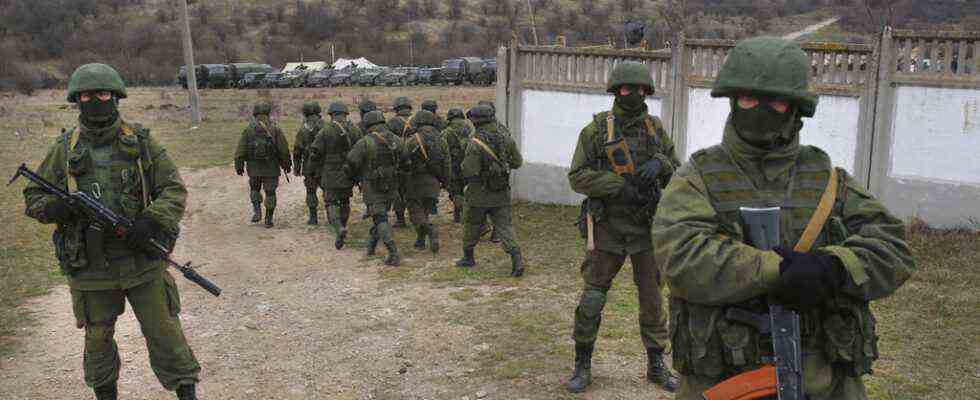fact finder
Status: 01/19/2022 12:34 p.m
The US has accused Russia of trying to create a pretext for an attack on Ukraine. There are such “false flag” actions in the military and secret services, but also in politics and on the Internet.
Amid the tense security situation surrounding Ukraine, reports of allegedly planned false flag operations by Russia, but also the US, have increased uncertainty. The fact that such allegations are difficult to prove and also to refute is part of such deceptive manoeuvres.
It’s a tactic with a long history: In the 16th century, pirates and buccaneers sailed under false flags in order to first deceive their target and then ambush them by surprise.
Covert operations under false flags also serve to justify attacks: own facilities are attacked and the opponent is portrayed as the perpetrator, often combined with propaganda. The German attack on the Gleiwitz transmitter on August 31, 1939 had the most devastating consequences: an SS commando disguised as Polish volunteers broke into the German radio station, tied up the employees and spread the news that the transmitter was in Polish hands. Using this as an excuse, Hitler ordered the Wehrmacht to invade Poland. The Second World War began.
During the 1962 Cuban missile crisis, the US Department of Defense Joint Chiefs of Staff developed plans for false flag operations. One of them was named Northwoods. The CIA was to stage terrorist attacks on civilian infrastructure and Cuban exiles in the US, for which Fidel Castro was to be blamed. This should have provided the pretext for an invasion of Cuba. But then-President John F. Kennedy opposed the operation. The relevant documents only became public after they had been declassified in the 1990s.
Act in secret, deny publicly
Another motive for such operations: credible deniability. The concept of “plausible deniability” was developed by the CIA in the 1950s and is also used by allies and opponents – when consequences in the form of military reactions or economic and political sanctions threaten and when international law is broken.
Such was the case with the “green men” who annexed Ukraine’s Crimea peninsula. Initially, the Russian leadership denied that the Russian military was involved there. Later, Russian President Vladimir Putin said he had ordered Crimea to be repatriated. The situation was similar in eastern Ukraine. Here, too, the Russian leadership later admitted that Russian security forces are active there.
The war in Syria has repeatedly been accused of false flag operations. The confusing and dangerous situation makes it even more difficult to verify such allegations. A common accusation is that the United States carried out false-flag poison gas attacks.
At the same time, the then US President Barack Obama did not follow up his threat that a red line would be crossed if chemical weapons were used. An independent UN commission of inquiry also found numerous poison gas attacks by Bashar al-Assad’s regime.
Mutual allegations about Ukraine
It sounded like an echo when Russia’s Defense Minister Sergei Shoigu claimed in December that US mercenaries were preparing Ukrainian special forces and armed groups for “active hostilities” in eastern Ukraine. They shipped an “unidentified chemical component” to the region. What Shoigu didn’t provide was evidence.
Now the United States is accusing the Russian leadership of planning false flag operations in Ukraine. White House spokeswoman Jen Psaki described this in quite some detail: Russian agents are trained in handling explosives and in “urban warfare” to carry out acts of sabotage against Russian officials. To justify a Russian intervention and to sow tensions in Ukraine, the media is provoked. The number of reports of Western influence, human rights abuses and a worsening of the situation that only Russia can improve is increasing.
John Kirby, spokesman for the US Department of Defense, emphasized that this Russian action from 2014 is known and “we see what they are doing”. As expected, Putin’s spokesman Dmitry Peskov denied these allegations.
Maximum confusion
The use of hybrid or active measures in connection with disinformation and propaganda as well as the use of mercenaries makes it difficult to understand military operations in conflicts worldwide – and also to draw a line between a state of peace and a state of war. In the case of the latter, binding rules under international law apply, such as the Geneva Convention on dealing with prisoners of war, for example.
False flag operations result in states and actors losing credibility. They invite you to develop conspiracy legends that spread rapidly on the Internet and thus stir up even more mistrust.
On social media such as Twitter, on the other hand, there are various versions of false flag actions to discredit opponents, for example to lure them on the wrong track or to tempt them to make emotional statements that can in turn be used against them. False letters of confession have also appeared several times to harm political opponents.
On the other hand, in addition to investigative media and researchers, there is a growing number of activists and organizations that make it their business to educate themselves using publicly available information, sometimes with enormous private commitment. Nowadays, troop deployments and transports by plane, train and ship can be traced almost in real time with the help of radar data and amateur videos on the Internet.
However, the targeted dissemination of such videos of military transports can also be used to create the impression of a threat and thus act as a deterrent.
No receipts
Despite, or perhaps because of, the large amount of sometimes contradictory information on the situation in Ukraine, it is unclear how realistic plans for alleged false flag operations are. The fact that crucial information is not provided is usually justified by the need to protect local sources. However, the less credible the allegations and actions themselves are, even if they are used frequently, the less effect they ultimately have.

